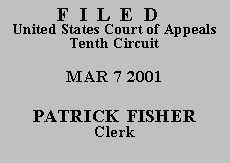

|
GLENN DAVID McGUIRE, |
|
Before HENRY, BRISCOE, and MURPHY, Circuit Judges.
This case is before the court on Glenn David McGuire's pro se request for a certificate of appealability ("COA"). McGuire seeks a COA so he can appeal the district court's denial of his 28 U.S.C. § 2254 petition. See 28 U.S.C. § 2253(c)(1)(A) (providing that no appeal may be taken from the denial of a § 2254 petition unless the petitioner first obtains a COA).
After a jury trial, McGuire was convicted of two counts of lewd molestation, after two or more felony convictions. He was sentenced to two, 100-year terms of imprisonment, to run concurrently. The Oklahoma Court of Criminal Appeals ("OCCA") affirmed McGuire's convictions and sentences. McGuire then sought post-conviction relief in Oklahoma state court, raising three issues that he had not raised in his direct appeal. McGuire asserted that he had failed to raise these issues because his appellate counsel was constitutionally ineffective.
The state district court denied post-conviction relief and McGuire sought review with the OCCA. The OCCA dismissed McGuire's appeal as untimely but McGuire then filed a second application for post-conviction relief requesting an appeal out of time. Although the state district court eventually recommended that McGuire be allowed to file a petition for a post-conviction appeal out of time, McGuire failed to file such a petition with the OCCA.
While McGuire's application requesting a post-conviction appeal out of time was pending, he filed the instant § 2254 petition with the United States District Court for the Northern District of Oklahoma. In his habeas petition, McGuire raised the three claims he originally raised in his application for state post-conviction relief. Respondent filed a motion to dismiss McGuire's petition, arguing that McGuire had failed to exhaust his state remedies. The district court concluded it would be futile to require McGuire to present his claims to the OCCA because the OCCA consistently applies a procedural bar to claims that have been procedurally defaulted. Consequently, the court denied Respondent's motion to dismiss. The court, however, ordered McGuire to show cause and prejudice or a fundamental miscarriage of justice to excuse his procedural default as to the claims raised in the habeas petition.
After reviewing McGuire's submissions, the district court concluded that all three of his claims were subject to the imposition of a procedural bar. The court further concluded that McGuire had failed to show cause for his procedural default. Finally, the court concluded that McGuire had made no claim of actual innocence and, thus, had failed to show a fundamental miscarriage of justice. See Herrera v. Collins, 506 U.S. 390, 403-04 (1993).
McGuire is not entitled to a COA unless he can make a "substantial showing of the denial of a constitutional right." Id. § 2253(c)(2). McGuire may make this showing by demonstrating that the issues raised are debatable among jurists, a court could resolve the issues differently, or that the questions presented deserve further proceedings. See Slack v. McDaniel, 529 U.S. 473, 483-84 (2000). This court has conducted a comprehensive de novo review of McGuire's request for a COA and accompanying brief, the district court's order, and the entire record on appeal. After that we review, we conclude that the district court correctly resolved McGuire's claims and that it is unnecessary for this court to expound on the district court's analysis. Accordingly, this court denies McGuire's request for a COA for substantially those reasons set forth in the district court's order dated August 31, 2000 and filed September 1, 2000, and dismisses this appeal.
ENTERED FOR THE COURT:
Michael R. Murphy
Circuit Judge
*. This order and judgment is not binding precedent, except under the doctrines of law of the case, res judicata and collateral estoppel. The court generally disfavors the citation of orders and judgments; nevertheless, an order and judgment may be cited under the terms and conditions of 10th Cir. R. 36.3.